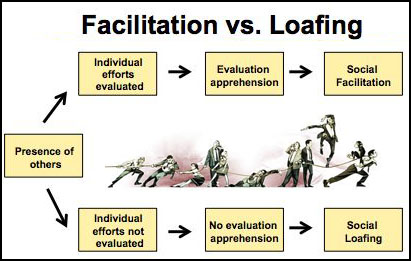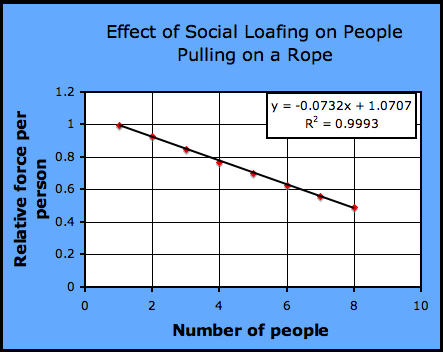
What…
I experienced social loafing while working in a group for my developmental psychology class. We were assigned to answer four questions presented on the board, discuss them and write a paragraph about our group’s consensus. At the time, we were not aware that our answers needed to be written as a group consensus, and instead wrote our own reflection for each question on a Google Doc. At 8:00 p.m., the night before the paper due date, one group member realized all the answers needed to be combined into one response per question. I suggested we divide up the questions and have one person edit the changes to make sure the responses flowed. I took initiative to be the editor. When everyone finished combining all the separate responses into one, I began revising and editing. The responses were terrible. My group members literally combined the responses, without connecting the ideas. Multiple responses consisted of “I,” “you” and “they,” in the same paragraph, which is not an acceptable demonstration of language at a college level. To exemplify how the ideas sounded in the responses: “I like bananas. You should take your dog to the groomers and tell her to do a good job.” Nothing made sense. In effect, I had to over-compensate my time and effort to make our responses presentable and sensible, since each group member did not put forth their full potential.
So what…


Levi defines social loafing as the “reduction of individual contributions when people work in groups rather than alone.” As a psychology major, the term could not have been described any better from what I learned in my introductory class. He further explains that individuals sometimes do not feel as if their group contributions make a difference, and therefore allow other members to adopt more responsibility. In relation to my experience, I took more time to edit all the responses because our contributions were acknowledged holistically. Individual efforts were not distinguished. Therefore, I claimed their responsibilities so I was not penalized for their lack of motivation.
In class, we also learned about a five stage model including the stages: forming, storming, norming, performing and adjourning. As a group, we bypassed the forming stage. Although we talked and reflected on the questions on the board, we did not take the time to establish strong relationships with each other and set aside clear objectives for future projects and tasks. In doing so, we opened a doorway for the uncertainty and dangerous assumptions. In other words, while I placed more emphasis on the quality and completion of the task at hand, the other members were probably placing more emphasis on speed and completion.
So now what…
Since I have to work with the same members to carry out more projects throughout the semester, I hope to avoid similar social loafing experiences in the future by ensuring that the instructions provided are thoroughly dissected and understand so we do not have to make extensive last minutes fixes. In essence, the objectives and broader goals must be well-defined, as well as uniformly understood by each group member. If social loafing were to occur again, I will most likely discuss with the group at a professional level the importance of cooperation and commitment, and then brainstorm ideas to motivate group members to fully complete their parts. In essence, I would need to recognize and acknowledge individual effort and strengths. This may be done by frequently commenting and providing both positive and negative feedback on different group member’s progress.
Levi, Daniel. Group Dynamics for Teams. Thousand Oaks, CA: Sage Publications, 2001. Print.